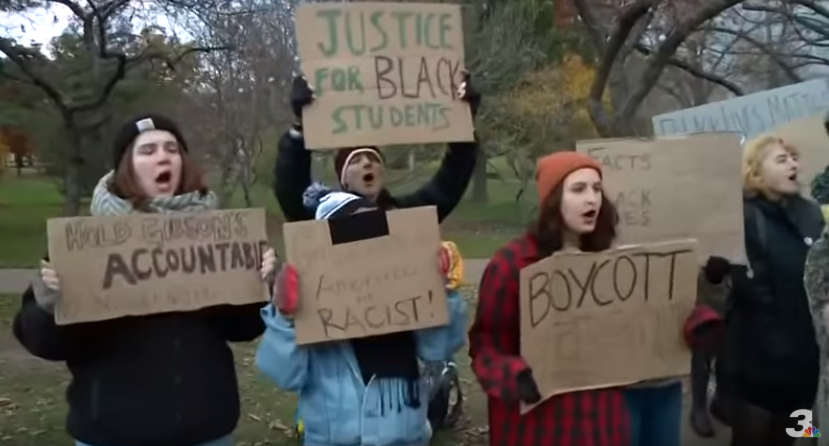Oberlin College Student Newspaper Editorial Blasts Jury Decision, Blames Verdict on “Authoritarian” United States

The repercussions of social justice activism have resounded across college campuses after an Ohio jury agreed with Gibson Bakery and fined Oberlin College $44 million in damages for orchestrating a smear campaign against the family-run bakery. Oberlin College is a private liberal arts college in the small town of Oberlin, Ohio. But the Oberlin Review, the student newspaper at Oberlin College, took issue with the jury’s decision and the case’s coverage by the mainstream media and “right-wing” media.
The editorial criticized the jury’s verdict, but also the mainstream media’s coverage of the lawsuit. In their own words, the Oberlin Review claimed that the “stunning decision” to punish Oberlin College for its social justice activism “strikes a serious blow against free speech on college campuses across the country.” The Oberlin Review claimed that the entire story was not accurately reported on by the media: “Unfortunately, much of the coverage and commentary has either inaccurately represented the lawsuit and the events that led up to it, or has only presented parts of the larger story.”
The Oberlin Review’s three main defenses of the college are the following:
- The Oberlin Police Department report did not represent the views of the accused shoplifters, only briefly acknowledging that the suspects’ version of events differed from the bakery’s view,
- Oberlin College did not encourage or organize students to boycott the bakery nor protest at the bakery,
- The college and its dean of students should not be responsible, or “on the hook,” for statements made by its students.
All three points are inherently flawed. First, the Oberlin Police Department did investigate the incident and the accused admitted they were shoplifting, which negates the Oberlin Review’s point that the accused were innocent of a crime. Also, the Oberlin Review made it a racial issue, much like the protesters did, and said, “This omission is meaningful — particularly in a country with a long and shameful history of manipulating testimony and evidence to criminalize people of color, especially Black people.” The newspaper continued on this rant, “That report defined the narrative that, from the beginning, was parroted by mainstream outlets and right-wing blogs alike to vilify the three Black students and those who came to their defense.” It is apparent that the student newspaper does not comprehend the criminal justice system because the suspects pled guilty to shoplifting.
Second, the newspaper did not announce new evidence that would prove the college and its students collaborated in a boycott and protest of the bakery. Instead, the newspaper relied on rhetoric and echoed the college’s claim that its employee, Meredith Raimondo, was at the protest to monitor the protesting students for safety reasons, without addressing the issue of her handing out anti-bakery flyers. The newspaper said it was “laughable” to think college students would take orders from the college administration, but again, it did not provide evidence to prove their point.
Lastly, the newspaper was not clear on their third line of defense at first, rambling about how the mainstream media framed the story incorrectly. But, their claim that the college and its dean of students should not be responsible for what their students say is a misleading claim. However, the newspaper failed to recognize that the college is ultimately responsible for its students’ conduct, though students pay the college to attend classes, because the college students threatened the safety of the bakery and its employees. Oberlin College, during the trial, said its role was to maintain the peace and keep both sides safe, but it failed to do so, which led to the jury’s decision.
Apparently, that is too hard for the Oberlin Review to comprehend, which called the verdict an example of “an increasingly authoritarian country” (a veiled shot at President Donald Trump) and that “this verdict is a real warning shot against free speech.” The newspaper also said jury’s decision to fine Oberlin College was “chilling” and that it “should broadly concern everybody who believes in the freedom of speech and student autonomy.” The Oberlin Review then called for students to continue “the kind of sustained and brave activism that emerged following the initial November 2016 incident at Gibson’s,” ignoring how social justice activism got the college in trouble in the first place.
As background, the bakery sued Oberlin College for defamation and for supporting a student boycott of the bakery. The lawsuit took place after a series of events that involved Oberlin College students, who stole items from the bakery, and the resulting retaliation from college administrators and students. At one point, Oberlin College Vice President and Dean of Students, Meredith Raimondo, allegedly passed out anti-Gibson’s Bakery fliers to protesters, but later claimed she was simply passing along information to those in the crowd and was only at the protest “to help ensure that a safe environment was maintained.
In November 2016, a black male student was caught red-handed trying to steal two bottles of wine, but the student’s associates then attacked the bakery employee. Although the shoplifting suspect and his two associates pled guilty to shoplifting and criminal trespass, in addition to admitting that Gibson Bakery was not racist, protests and anti-bakery rhetoric continued to escalate. The college’s defensive strategy was to play the victim and blame the bakery for physical assault against the shoplifters, but the jury did not buy that those claims. The jury handed down $22 million in damages to be paid to the bakery by Oberlin College.




